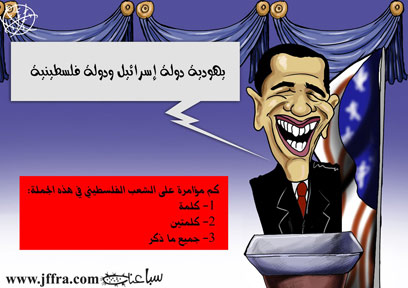
The Arab press saw eye to eye with the Western media on Friday in the bleak outlook it forecasted in its coverage of Israeli-Palestinian negotiations. The day after the direct talks were officially launched in Washington, headlines in the Arab press were characterized by skepticism over the renewed peace process.
"A television spectacle with no impact," an editorial in hawkish London-based newspaper al-Quds al-Arabi deemed the talks. The paper tried to lower the Arab worlds expectations regarding the negotiation's outcome.

Caricature run in a-Sharq al-Awsat
"The Americans think they can credit themselves with a big achievement for meeting between the two sides in front of the television cameras. They think that it broke a psychological barrier that led to the direct talks to be cut short two years ago, but the same difficulties are still alive and kicking," the article wrote.
Past experience, according to the newspaper's editors, leads them to believe that the fate of the upcoming round of talks will not be especially different than those preceding it.
"We don't know what happened in the closed meeting between (Palestinian President Mahmoud) Abbas and (Prime Minister Benjamin) Netanyahu, but we remember well that previous talks between him and (former Prime Minister Ehud) Olmert did not result in any progress in the negotiations or stop the building of even one housing unit in the settlements," the article wrote.

The Israeli military hare outrunning the peace tortoise. From al-Hayat
However, the al-Quds al-Arabi editorial expressed its concerns that Abbas is trying to make an underhanded move in the form of far-reaching concessions with Israel without receiving a mandate for doing so from his people.
"We are worried that all the leaks about the possibility for the failure of the negotiations are nothing more than a smoke screen meant to cover up what has been cooking below the surface in secret meetings in recent months and will only be reveals at the end of talks in another year."
The editorial also quipped, "President Abbas is the weakest link in this process. He negotiates without being granted the authorization to do so by his people and surrenders to American and Israeli pressures. If they succeeded in bringing him to direct talks, why wouldn’t the influence him in the same manner to sign a peace agreement settled according to Israel's conditions?"

From al-Hayat. Obama says, 'Jewish state of Israel and a Palestinian state.' In the red box: 'How many plots against the Palestinian people are contained in this sentence? 1. One word 2. Two words 3. The whole sentence
Meeting for the wrong reasons?
In London-based newspaper al-Hayat, columnist Hussam al-Ittani addressed the matter, saying that he does not expect any grandiose breakthroughs.
"The sides negotiating in Washington did not start doing so out of a sense that a new opportunity exists that allows them to progress towards peace and solving the conflict," he wrote. "They are meeting for the opposite reason – the lack of ability to achieve peace and their desperation from trying to find breakthroughs that will open up new horizons for a solution."
Like in the British press, al-Ittani took note, "Jerusalem, the refugees, and borders – these are the issues that Netanyahu did not mention at all in his speech. These are part of the preconditions he stipulated. In reality, it says in other words that the attempt to achieve peace will not get far because this possibility does not exist in his eyes."
- Follow Ynetnews on Facebook















